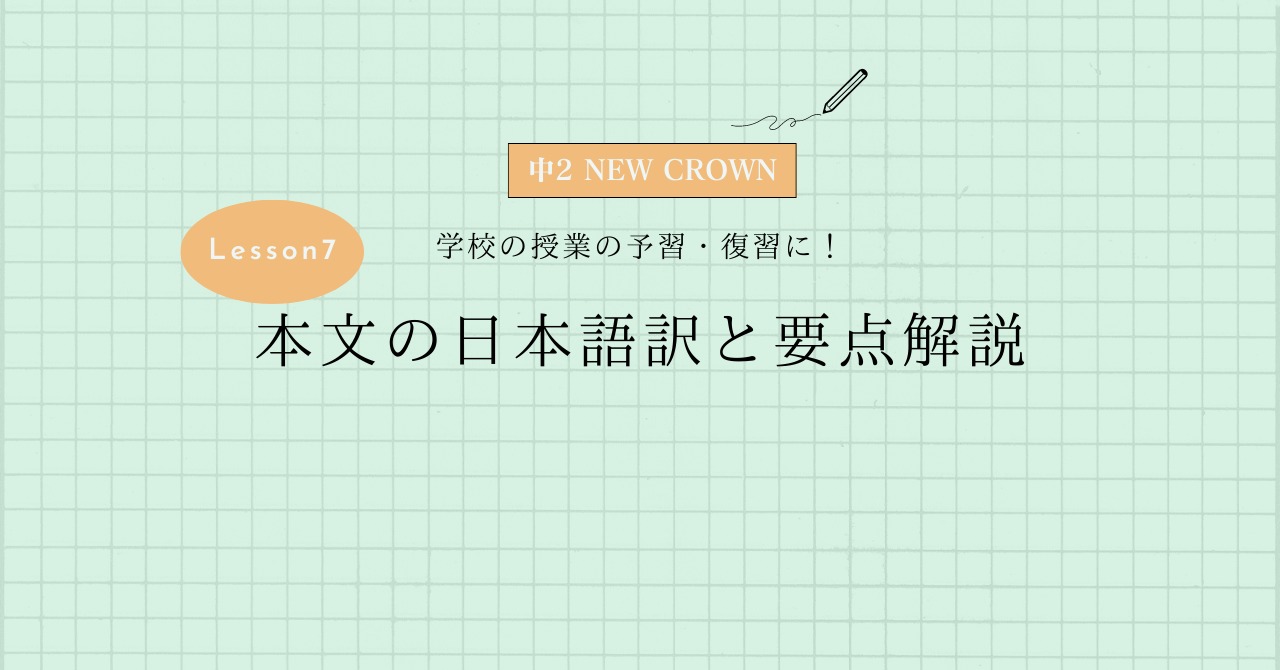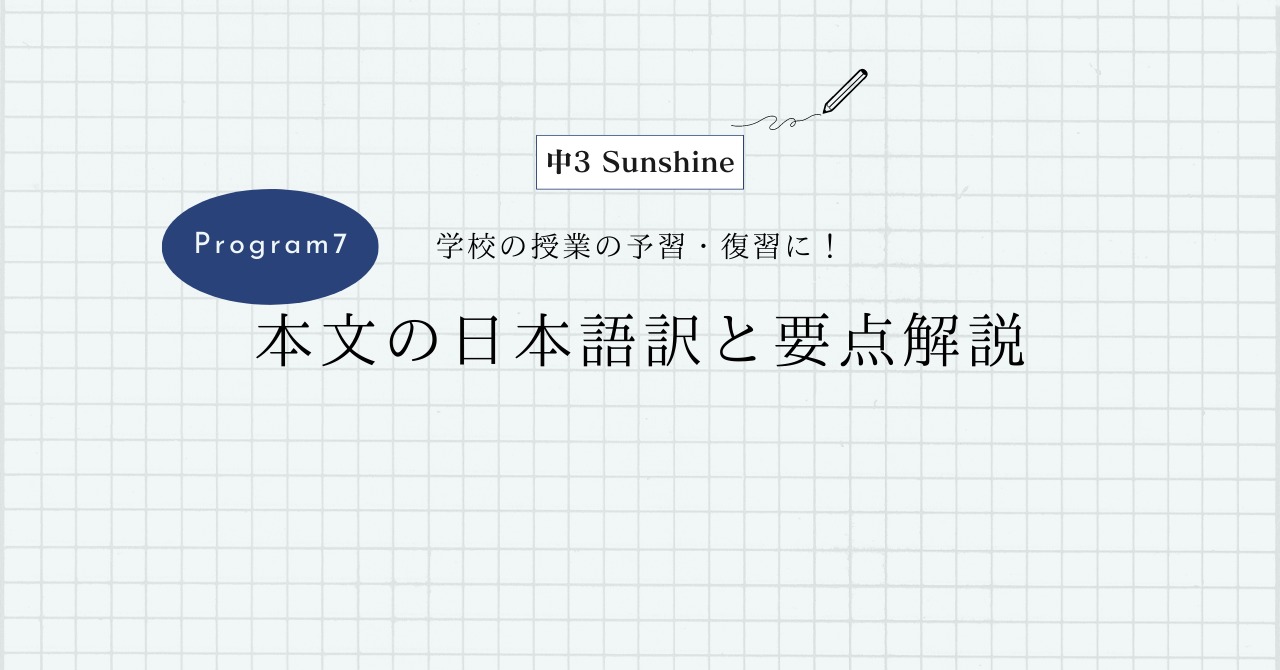三省堂 中学2年生 NEW CROWN(ニュークラウン) Lesson7 Part3の本文の日本語訳と重要箇所の解説です。
Lesson7-1, 7-2の解説はこちらからご覧ください。
>中2NEW CROWN Lesson7 Part1 本文和訳
>中2NEW CROWN Lesson7 Part2 本文和訳
- Lesson7 Part3 本文と日本語訳
- Lesson7 Part3 重要事項の解説
- Rakugo Goes Overseas
- Kimie-san, today’s performance was really great!
- I’d like to ask you a few questions.
- Why did you start performing rakugo in English?
- When I lived in the United States, many people said, “I’ve never heard a Japanese joke. Could you tell me one?”
- They didn’t think the Japanese had a sense of humor.
- Yeah. So I wanted to share Japanese humor with people all over the world.
- How long have you been a performer?
- For about twenty-five years.
- I’ve been to many countries to give rakugo shows.
- These tours have been very exciting.
- Have you had any difficulty with your rakugo performances in English?
- Yes, I have. Sometimes there are cultural differences between Japan and other countries.
- For example, we make sounds when we eat noodles.
- So I have to explain Japanese customs like this.
- Then everyone can enjoy the show.
- What have you learned from your performances around the world?
- Well, in my opinion, we’re different, but we also have things in common, like laughter.
- We can laugh together during a rakugo performance.
- I see. What’s your future plan?
- To continue spreading laughter.
- I think this will make a more peaceful world.
- I’ve enjoyed talking with you.
- My pleasure.
- Lesson7 Part3 まとめ
Lesson7 Part3 本文と日本語訳
Rakugo Goes Overseas
「落語が海外に行く」
I: interviewer K: Kimie-san
I: インタビュアー K: 希巳江さん
I: I’m David Miller from The Crown News.
「私はクラウン・ニュースのデイビッド・ミラーです。」
Kimie-san, today’s performance was really great!
「希巳江さん,今日の公演は本当に素晴らしかったです!」
K: Thank you, David.
「ありがとうございます,デイビッド。」
I: I’d like to ask you a few questions.
「いくつか質問をしたいと思います。」
Why did you start performing rakugo in English?
「なぜあなたは英語で落語の上演を始めたのですか?」
K: When I lived in the United States, many people said, “I’ve never heard a Japanese joke. Could you tell me one?”
「私がアメリカに住んでいたときに,多くの人は『日本語の冗談を聞いたことがない。教えてくれない?』と言っていました。」
They didn’t think the Japanese had a sense of humor.
「彼らは日本語にユーモアを分かる心がないと思っていました。」
I: Really?
「本当に?」
K: Yeah. So I wanted to share Japanese humor with people all over the world.
「はい。だから私は日本語のユーモアを世界中の人に伝えたかったのです。」
I: How long have you been a performer?
「どれくらい演者をやっているのですか?」
K: For about twenty-five years.
「約25年です。」
I’ve been to many countries to give rakugo shows.
「落語のショーをするために多くの国に行きました。」
These tours have been very exciting.
「こういったツアーはとてもワクワクさせてくれています。」
I: Have you had any difficulty with your rakugo performances in English?
「英語での落語の公演で何か難しいことはありましたか?」
K: Yes, I have. Sometimes there are cultural differences between Japan and other countries.
「はい。時々,日本と他の国の間に文化の違いがあります。」
For example, we make sounds when we eat noodles.
「例えば,私たちは麺を食べるとき音を立てます。」
In other cultures, this is bad manners.
「他の国では,これは悪いマナーとされます。」
So I have to explain Japanese customs like this.
「だから,私はこのような日本の習慣を説明しなければなりません。」
Then everyone can enjoy the show.
「そうすると皆がショーを楽しめます。」
I: What have you learned from your performances around the world?
「世界中での公演から何を学んでいますか?」
K: Well, in my opinion, we’re different, but we also have things in common, like laughter.
「ええと,私の意見では,私たちは異なりますが,笑いのような共通するものもあります。」
We can laugh together during a rakugo performance.
「落語の上演中は一緒に笑うことができます。」
I: I see. What’s your future plan?
「なるほど。将来の計画は何ですか?」
K: To continue spreading laughter.
「笑いを広め続けることです。」
I think this will make a more peaceful world.
「こうすることでもっと平和な世界になると思います。」
I: Thank you for your time.
「お時間をいただきありがとうございました。」
I’ve enjoyed talking with you.
「お話しできて楽しかったです。」
K: My pleasure.
「どういたしまして。」

Lesson7 Part3 重要事項の解説
Rakugo Goes Overseas
“overseas”は「海外に」という副詞になります。
Kimie-san, today’s performance was really great!
名詞に‘sを付けると「~の」という所有を表します。
直前の名詞が複数形のときは” teachers‘ “のようにアポストロフィーだけを最後に付けます。
“performance”は「上演,公演」という名詞です。
I’d like to ask you a few questions.
“would like~”は「~が欲しい」で,“would like to 動詞の原形”で「~したい」となります。
“want to 動詞の原形”と同じですね。「不定詞の名詞的用法」と一緒に確認しておきましょう。
“ask 人 もの”は「人にものを尋ねる,聞く」という重要表現です。
“a few”は「いくつかの,2・3の」という意味で,後ろには数えられる名詞(可算名詞)が来ます。
ちなみに数えられない名詞(不可算名詞)が来る場合は“a little”を使いますよ!
Why did you start performing rakugo in English?
“perform”は「を上演する,演じる」という動詞で,“performing”は「動名詞」になっていますね。
“in 言語”で「~語で」となります。
When I lived in the United States, many people said, “I’ve never heard a Japanese joke. Could you tell me one?”
この文では「現在完了の経験用法」が使われていますね。また,「接続詞when」も使われています。
“heard”は“hear”の過去形で,「を聞く」という意味ですね。発音は「ハード」ですよ!
“joke”は「冗談,ジョーク」という名詞です。
“Could you~?”は「~してくれませんか?」というお願いをする表現です。“Can(Will) you~?”よりも丁寧なニュアンスになります。
“one”は“a Japanese joke”を指していますね。
“tell 人 もの”で「人にものを伝える,教える」となって,“tell もの to 人”でも同じ意味になります。
他には“teach”, “show”, “give”などが同じ使い方をできるので必ず書き換えられるようにしておきましょう。
They didn’t think the Japanese had a sense of humor.
この文では「接続詞that」が使われていますね。否定文は必ず”that”より前を否定形にします。
“sense”は「感覚,センス,わかる心」,“humor”は「ユーモア」という名詞です。
“of”は前置詞で,”A of B”の形で「BのA」というように後ろから前に訳します。
Yeah. So I wanted to share Japanese humor with people all over the world.
“so”は「だから」という接続詞ですね。
“share”は“share A with B”で「AをBと共有する,AをBに伝える」といった意味になります。
“all over the world”は「世界中」という意味ですね。
How long have you been a performer?
この文では「現在完了の継続用法」が使われていますね。
“how long~?”は「どのくらい~?」という期間を尋ねる疑問詞です。
“performer”は「演者」という名詞です。
For about twenty-five years.
“for 数字”で「~間」という意味ですね。
“about”は「約,およそ」という副詞になります。
I’ve been to many countries to give rakugo shows.
この文では「現在完了の経験用法」が使われていますね。
“to give”は「不定詞の形容詞的用法」になっています。
These tours have been very exciting.
この文では「現在完了の継続用法」が使われていますね。
“these”は“this”の複数形で「これらは,これらの」という意味です。
“tour”は「ツアー」ですね。
Have you had any difficulty with your rakugo performances in English?
この文では「現在完了の経験用法」が使われていますね。
“anyは「いくつかの,何か」という意味で,たくさんはないけど複数あることを意味します。日本語訳するときは訳さないことも多いです。
そして“any”の後ろには,数えられる名詞(可算名詞)と数えられない名詞(不可算名詞)のどちらも置くことができます。
また,「何か」という意味では“any”は肯定文のときには使えず,疑問文の場合は代わりに“some”を使います。
肯定文で”any 単数名詞”で使うと「どんな~でも」という意味になりますよ!
“difficulty”は「難しさ,困難」という名詞になります。
Yes, I have. Sometimes there are cultural differences between Japan and other countries.
この文では「there構文」が使われていますね。
“sometimes”は「時々」という副詞で,“cultural”は「文化の」,“difference”は「違い」という名詞です。
“between A and B”は「AとBの間」という重要表現になります。
For example, we make sounds when we eat noodles.
この文では「接続詞when」が使われていますね。
“for example”は「例えば」という重要表現です。
“make sounds”は「音を立てる」,“noodle”は「麺」という意味ですね。
So I have to explain Japanese customs like this.
“have to 動詞の原形”は「~しなければならない」ですね。
“explain”は「を説明する」という動詞,“custom”は「習慣」という名詞です。
“like”は「~のような」という重要な前置詞になりますね。
Then everyone can enjoy the show.
“then”は「それから,そのとき,そうすると」といった意味の副詞です。文に応じて柔軟に訳してあげてください。
What have you learned from your performances around the world?
この文では「現在完了」が使われていますね。
“learn”は「を学ぶ,身につける」という動詞です。
“around the world”は「世界中」ですね。
Well, in my opinion, we’re different, but we also have things in common, like laughter.
“in my opinion”は「私の意見では」という重要表現です。
“different”は「異なった,様々な」という形容詞で,“thing”は「もの,こと」,“laughter”は「笑い」という名詞になります。
“in common”は「共通して」という表現ですね。
“also”は「また,さらに」といった副詞で,付け加える役割があります。色々な文で使うので必ず覚えましょう!
We can laugh together during a rakugo performance.
“laugh”は「笑う」という動詞で,“together”は「一緒に」という副詞,“during”は「~の間」という重要な前置詞になりますね。
I see. What’s your future plan?
“I see.”は「そうなんだ,へえ,なるほど」といった相槌になります。
“future”は「未来の」という形容詞で,“plan”は「計画」という名詞ですね。
To continue spreading laughter.
ここでは“My future plan is”という主語と動詞が省略されていますね。
“continue”は「を続ける」,“spread”は「を広げる」という動詞です。
“To continue”は「不定詞の名詞的用法」で,“spreading”は「動名詞」になっていますね。
I think this will make a more peaceful world.
この文では「接続詞that」が省略されていますね。
“make 名詞 形容詞/名詞”で「名詞を~(の状態)にさせる」という重要表現になります。
このとき主語が「人以外」なら,「~によって…(の状態)になる」くらいで訳すと綺麗な日本語になりやすいです。
“peaceful”は「平和な」という形容詞で,ここでは「比較級」になっていますね。
I’ve enjoyed talking with you.
この文では「現在完了」が使われていますね。
“talking”は「動名詞」になっています。
My pleasure.
“pleasure”は「楽しみ,喜び」という名詞です。
“My pleasure.”は「どういたしまして。」となります。
Lesson7 Part3 まとめ
以上がLesson7 Part3の日本語訳となります。
ここでは「現在完了用法」をそれぞれしっかりと理解しましょう!
>中2NEW CROWN Lesson7 Part1 本文和訳
>中2NEW CROWN Lesson7 Part2 本文和訳
何か分からない点や他に解説してほしい点があれば,お気軽にコメントしてください!




コメント